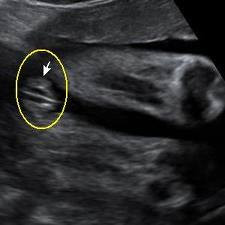Scientific Ways to Predict Baby's Gender
Scientific Ways

Ultrasound Scan
 Ultrasound is a kind of sound wave. So far, no report shows that it is adverse to the fetus. Therefore, it has been widely applied in the obstetrics and gynecology. Generally, the baby's gender can be clearly identified when the pregnancy exceeds 16 weeks. The detection method mainly observes the reproductive organ of the fetus, so it is directly related to the fetal position and the doctor's experience. When the ultrasound is used in identifying the baby's gender, the accuracy for baby boys is more than 95% but only about 85% for baby girls.
Ultrasound is a kind of sound wave. So far, no report shows that it is adverse to the fetus. Therefore, it has been widely applied in the obstetrics and gynecology. Generally, the baby's gender can be clearly identified when the pregnancy exceeds 16 weeks. The detection method mainly observes the reproductive organ of the fetus, so it is directly related to the fetal position and the doctor's experience. When the ultrasound is used in identifying the baby's gender, the accuracy for baby boys is more than 95% but only about 85% for baby girls.Amniocentesis
Amniocentesis is mainly for the purpose of diagnosing the chromosome or neuraltube defects of the fetus and it is often carried out between the 16th and 20th gestational week. Since it can detect the fetal chromosome, the baby's gender can be clearly identified. The accuracy is up to 99%, but it has the abortion rate of 1%. Therefore, amniocentesis is not recommended by the medical circle if it is only used for detecting the baby's gender.
Chorionic Villus Sampling
Also known as "chorionic sampling", it is often carried out between the 8th and 10th gestational week. Same with amniocentesis, it is mainly for the purpose of diagnosing whether the fetal chromosome is normal or not. However, some people also use it to identify the baby's gender and the accuracy is up to 98%.
Although chorionic villus sampling can identify the baby's gender as early as in the 10th gestational week or so, it may lead to the abortion (3% to 5%) or harm the fetus and make its hands or feet disabled. Therefore, it's better not to accept this sampling for the purpose of identifying the baby's gender.
Although chorionic villus sampling can identify the baby's gender as early as in the 10th gestational week or so, it may lead to the abortion (3% to 5%) or harm the fetus and make its hands or feet disabled. Therefore, it's better not to accept this sampling for the purpose of identifying the baby's gender.
Blood Test
The baby's gender can be identified by using the gene engineering technology to sample the mother's blood. It has no risk to the fetus and some test units claim that the reliability is up to 95%. As long as the pregnancy is over 8 weeks, the baby's gender can be identified by sampling the venous blood for test. However, the clinical data and evidence indicate that the error ratio is quite high. Therefore, it might not be a practical and reliable method.
More Ways to Predict Baby's Gender
Chinese Baby Gender Prediction Chart Baby Gender Prediction by Reading Parents’ Face Pregnancy Dreams Revealing Baby's Sex Predicting Baby's Gender by Reading Palm Line of Children 23 Old Wives Tales for Predicting Baby's Gender in China
Chinese Baby Gender Prediction Chart Baby Gender Prediction by Reading Parents’ Face Pregnancy Dreams Revealing Baby's Sex Predicting Baby's Gender by Reading Palm Line of Children 23 Old Wives Tales for Predicting Baby's Gender in China
Lastest Questions and Answers
Gender prediction (3 Replies ) Asked by P***
LMp January 30 dob September 10 1994 ab 9month chal raha hai presmdect my baby gender
Baby gender prediction (1 Reply ) Asked by N***
I want to know my baby gender.
Need to move on an inauspicious date... can I counteract that? (1 Reply ) Asked by d***a
The way my move is working out, I need to drive from Los Angeles to Vancouver on June 24 and 25, which are inauspicious dates for residence relocation and moving. What are ways to counteract this, and will I suffer bad fortune for years to come?
Gender predict (110 Replies ) Asked by H***
Please my date of birth is 23 May 1987. I had my period of February. I missed my period on March can pls help me predict weather I will give birth to a girl or BOY
what my baby gender (1 Reply ) Asked by S***i
My birth day: 28/11/1994 My date of conception: 7/2/2024 what my baby gender?
